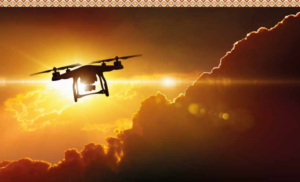
 The African Union and the New Partnership for Africa’s Development (NEPAD) have published a drone report outlining the potential and the challenges for the drone industry on the continent.
The African Union and the New Partnership for Africa’s Development (NEPAD) have published a drone report outlining the potential and the challenges for the drone industry on the continent.
The most successful drone delivery programs in the world are currently deployed in Africa. Medical logistics and drone delivery company Zipline has implemented delivery of medical and blood supplies to remote clinics in Rwanda: they plan to expand the program to Tanzania. In Malawi, UNICEF has implemented the first successful drone corridor for the delivery of vaccination supplies to rural areas. The report, however, sees the primary potential for the industry in precision agriculture.
“Agriculture forms the basis for well-being and poverty reduction in Africa,” says the report. “However, with an increase in input costs and uncertainties of weather patterns, a need has risen for countries to adopt farming practices that will increase yields with lowered inputs while optimizing profit….Optimizing agricultural profit through increasing productivity and improved yield has benefited from several innovative developments over the years; one of these being the use of drones technology.”
The report calls for African countries to work actively to promote precision agriculture with drones. “…This situation calls for a review of agricultural policies and practices, and an explicit understanding that enabling policies for the promotion of such drone technologies must be formulated,” says the report.
In addition to precision agriculture, the report says that land use planning processes, small cargo delivery, scientific research, and other areas could benefit from drones.
Is Africa Ready for Drones?
One of the challenges that the continent faces in fully utilizing drone technology is that drones are still an unfamiliar tool to most of the populace: “Drone technologies are considered emerging, and are thus are quite novel, especially in Africa,” says the report.
The authors point out, however, that countries are more willing to utilize drones in an emergency situation such as a pressing public health issue or environmental event.
In addition to a lack of familiarity, the regulatory framework is insufficient to deal with drones in most of the African countries: the report says that only 26% of the countries currently have drone regulations in place: some countries have placed a temporary ban on drones.
Current Implementations
Where drones are legal, they’re being used successfully, the report points out. The medical drone delivery programs are just one example. Morocco utilizes drones in agribusiness and surveillance of ports and construction progress. Drones are used for flood mapping in Tanzania, in order to predict and reduce the risk to affected communities.
In Namibia, Congo and South Africa, drones have been used to protect wildlife species and land. Drones used for surveillance can monitor the vast areas of protected land. Drones equipped with AI can help law enforcement to identify poachers of big game including rhinos and elephants.
Challenges Ahead
While researchers see enormous potential for the drone industry to benefit Africa, they point out the challenges in the way of broad adoption. Technology issues and regulatory framework are only part of the problem. Economic issues may limit the number of farmers who are able to afford the technology. Social acceptance is also a significant barrier to be overcome.
Despite the challenges, the report clearly concludes that drone technology holds significant benefit for the continent – and should be pursued by African governments.
“In conclusion, this report considers drone technology for precision agriculture as a potential game-changer for the African continent,” it says. “The report recommends that the adoption, deployment and upscaling of UAS in the context of precision agriculture is considered as a priority.”
Miriam McNabb is the Editor-in-Chief of DRONELIFE and CEO of JobForDrones, a professional drone services marketplace, and a fascinated observer of the emerging drone industry and the regulatory environment for drones. Miriam has penned over 3,000 articles focused on the commercial drone space and is an international speaker and recognized figure in the industry. Miriam has a degree from the University of Chicago and over 20 years of experience in high tech sales and marketing for new technologies.
For drone industry consulting or writing, Email Miriam.
TWITTER:@spaldingbarker
Subscribe to DroneLife here.
